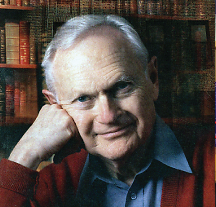Physician Sees Widening Gap Separating Doctor and Patient
Abstract
By most measures, surgeon, author, and educator Sherwin Nuland, M.D., is a great physician. By his own definition, he’s a “good” one too.

The good doctor is in: Sherwin Nuland, M.D., will discuss what it means to care for patients in more ways than one.
Nuland believes that while physicians’ kindness, compassion, and morality have been thought to play a key role in healing since the days of Hippocrates, “medicine at a distance” has increasingly become the standard of care. According to Nuland, this weakening of the doctor-patient relationship is in need of redressing.
Nuland has been invited as a guest lecturer at APA’s 2012 annual meeting in Philadelphia in May. In his lecture, titled “The Goodness of the Physician: From Hippocrates to High-Tech,” he will discuss how to strengthen the bond between doctor and patient to achieve lasting improvements in wellness and well-being.
Recently retired as a clinical professor of surgery at the Yale School of Medicine, Nuland serves on the executive committee of Yale’s Interdisciplinary Center for Bioethics and is a fellow of the American Association for the Advancement of Science, the Hastings Center, and Yale’s Institution for Social and Policy Studies.
After 30 years of practicing surgery at Yale-New Haven Hospital, Nuland launched a second career as a celebrated author of books on medical history and biomedical ethics. His 1994 best-seller, How We Die —a reflection on the modern way of death—won that year’s National Book Award and was a finalist for the 1995 Pulitzer Prize.
Nuland’s other books include Doctors: The Biography of Medicine; How We Live; The Mysteries Within: A Surgeon Explores Myth, Medicine, and the Human Body; The Doctors’ Plague: Germs, Childhood Fever, and the Strange Story of Ignac Semmelweis; The Art of Aging: A Doctor’s Prescription for Well-Being; and The Soul of Medicine: Tales from the Bedside. He has also written biographies of Leonardo da Vinci and the 12th-century Jewish sage Maimonides.
From 1998 to 2003, he wrote a column on medicine for The American Scholar, the contents of which were later published in book form under the title The Uncertain Art: Thoughts on a Life in Medicine.
In 2003, Nuland released a memoir (Lost in America: A Journey With My Father) in which he described a life-changing bout with depression. Nuland’s struggle with mental illness became so severe that he ended up spending more than one year in a psychiatric hospital. Following unsuccessful attempts to treat his depression with psychotherapy and medication, physicians at the institution recommended that he undergo a lobotomy.
It was the passion and commitment of a 27-year-old psychiatry resident at the hospital who threatened to resign in disagreement with his superiors that ultimately saved Nuland from the procedure. Nuland subsequently underwent a course of electroconvulsive therapy that he credits for his recovery.
Regrettably, this type of recognition of patients’ humanity has gotten lost amid an increased focus on evidence-based medicine and the bottom line, according to Nuland in the October 2000 Yale Alumni Magazine.
“The ideal doctor, the true caregiver, also needs the skills of the heart: the ability to create the aura that a patient is important to the physician and they’re both enmeshed in a journey they’re taking together,” he said. 



